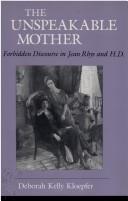| Listing 1 - 2 of 2 |
Sort by
|
Digital
ISBN: 9783319981802 Year: 2018 Publisher: Cham Springer International Publishing :Imprint: Palgrave Macmillan
Abstract | Keywords | Export | Availability | Bookmark
 Loading...
Loading...Choose an application
- Reference Manager
- EndNote
- RefWorks (Direct export to RefWorks)
This collection takes as its starting point the ubiquitous representation of various forms of mental illness, breakdown and psychopathology in Caribbean writing, and the fact that this topic has been relatively neglected in criticism, especially in Anglophone texts, apart from the scholarship devoted to Jean Rhys’s Wide Sargasso Sea (1966). The contributions to this volume demonstrate that much remains to be done in rethinking the trope of “madness” across Caribbean literature by local and diaspora writers. This book asks how focusing on literary manifestations of apparent mental aberration can extend our understanding of Caribbean narrative and culture, and can help us to interrogate the norms that have been used to categorize art from the region, as well as the boundaries between notions of rationality, transcendence and insanity across cultures. .
American literature --- Literature --- diaspora --- literatuur --- psychopathologie --- Kincaid, Jamaica --- Díaz, Junot --- Brodber, Erna --- Collins, Merle --- James, Marlon --- Miller, Kei --- Rhys, Jean --- Phillips, Caryl --- anno 1900-1999 --- Caribbean area --- Latin America

ISBN: 0801421640 9781501726316 1501726315 9780801421648 1501726323 1501727958 Year: 2018 Publisher: Cornell University Press
Abstract | Keywords | Export | Availability | Bookmark
 Loading...
Loading...Choose an application
- Reference Manager
- EndNote
- RefWorks (Direct export to RefWorks)
In a book that compares Virginia Woolf's writing with that of the novelist, actress, and feminist activist Elizabeth Robins (1862-1952), Molly Hite explores the fascinating connections between Woolf's aversion to women's "pleading a cause" in fiction and her narrative technique of complicating, minimizing, or omitting tonal cues. Hite shows how A Room of One's Own, Mrs. Dalloway, and The Voyage Out borrow from and implicitly criticize Robins's work.Hite presents and develops the concept of narrative tone as a means to enrich and complicate our readings of Woolf's modernist novels. In Woolf's Ambiguities, she argues that the greatest formal innovation in Woolf's fiction is the muting, complicating, or effacing of textual pointers guiding how readers feel and make ethical judgments about characters and events. Much of Woolf's narrative prose, Hite proposes, thus refrains from endorsing a single position, not only adding value ambiguity to the cognitive ambiguity associated with modernist fiction generally, but explicitly rejecting the polemical intent of feminist novelists in the generation preceding her own. Hite also points out that Woolf reconsidered her rejection of polemical fiction later in her career. In the unfinished draft of her "essay-novel" The Pargiters, Woolf created a brilliant new narrative form allowing her to make unequivocal value judgments.
English literature --- Thematology --- anno 1900-1999 --- Narration (Rhetoric) --- Narration (Rhétorique) --- Narrative writing --- Verhaal (Retoriek) --- English fiction --- Feminism and literature --- Women authors --- History and criticism. --- History --- History and criticism --- 20th century --- Rhys, Jean --- Technique --- Lessing, Doris May --- Walker, Alice --- Atwood, Margaret Eleanor --- Atwood, Margaret, --- Lessing, Doris, --- Walker, Alice, --- Technique. --- Williams, Ella Gwendolen Rees --- Rees Williams, Ella Gwendolen --- Literature: history & criticism
| Listing 1 - 2 of 2 |
Sort by
|

 Search
Search Feedback
Feedback About UniCat
About UniCat  Help
Help News
News